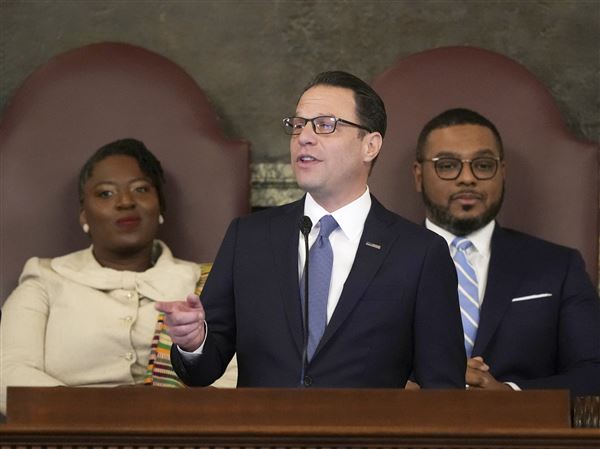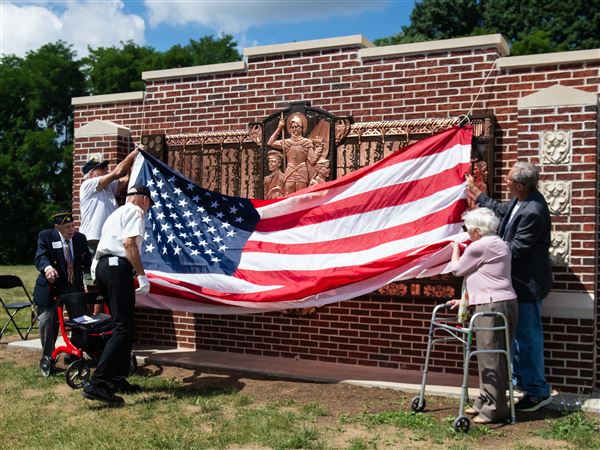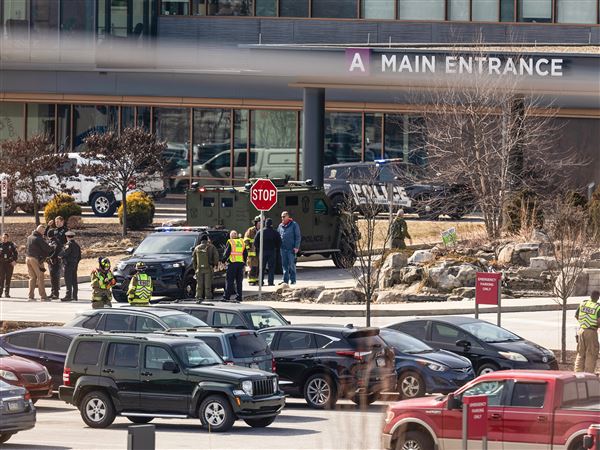One year ago, a man who was angry over the death of his infant daughter entered an Amish schoolhouse and shot 10 little girls, killing five before he killed himself.
Horrified strangers worldwide sent $4.3 million to the Nickel Mines Amish settlement in Bart, Lancaster County. But the Amish, who have no insurance, used the gifts for more than medical bills.
They gave shares to local emergency services that came to their aid and, in a move that caught the world's imagination, to the widow and children of the man who murdered their daughters.
Coverage of their acts of forgiveness and reconciliation in the face of unspeakable horror and grief quickly overwhelmed coverage of the murders. Suddenly people were asking profound questions about a culture known more for its rejection of cars, television and other trappings of modern life than for its ideals. Their response continues to have a wide impact.
"Within the first week there were 2,400 stories about forgiveness on the Web from news media around the world," said Donald Kraybill, senior fellow at the Young Center for Anabaptist Studies at Elizabethtown College in Lancaster County. "I was just astonished that forgiveness became news."
Miroslav Volf, director of the Yale Center for Faith and Culture at Yale Divinity School, believes the events occurred at a crucial cultural moment.
"It came at a time when, rightly or wrongly, religion was in the news but not in a way that was flattering. I'm thinking about religiously sanctioned violence, Middle East terrorism, and the people who were making strong claims that religion is a source of conflict and violence," said Mr. Volf, a theologian who specializes in forgiveness. "In the midst of all this ... you suddenly have this prominent case where it is shown in a very different, positive light. I think that is why the story remains powerful."
The final words and notes of the killer, 32-year-old milk truck driver Charles Roberts IV, tell of the rage he had held against God since the death of an infant daughter in 1997. At about 10 a.m. on Oct. 2 he entered the one-room school armed with guns, restraints and sexual lubricants. The teacher fled to call for help. He bound the girls with plastic cable ties, saying no one would be hurt if they obeyed him, and ordered the boys to leave.
The survivors said he told them, "I'm angry at God and I need to punish some Christian girls to get even with him. ... I'm going to make you pay for my daughter."
When police surrounded the school, he gave up his plan for sexual assault and shot the girls in the head. A state trooper burst through a window as he reloaded, and with his final shot he killed himself. Five girls were dead or dying. Five more were critically injured, but would survive.
The evening of the shootings, Amish elders went to Mr. Roberts' home, where his wife lived with three young daughters, and to the home of his parents to embrace his family and say they held no grudges.
Later on, dozens of Amish, including some whose children he had murdered, attended Mr. Roberts' burial and offered condolences to his widow, Amy.
A parent of one of the dead girls told Dr. Kraybill, and Steven M. Nolt and David Weaver-Zercher, his co-authors of "Amish Grace: How Forgiveness Transcended Tragedy": "The pain of the killer's parents is 10 times my pain. You would just feel terrible if you were the parent of a killer."
The Amish consider their response typically Christian.
It isn't, Dr. Kraybill said.
"Typical Protestant forgiveness theology says God has forgiven you, so you should pass it on to other people," he said. "The Amish flip it and say, if we don't forgive, we won't be forgiven. In that sense it leads directly to their salvation,"
Forgiveness is the beginning
The response is bonded into their spiritual DNA by a faith forged in martyrdom. Even the youngest children know stories from 16th-century Europe, when their forebears were persecuted by Catholic, Protestant and secular authorities for their refusal to baptize infants and for their belief that true Christianity could not be enforced by the state.
"Thousands were burned at the stake or decapitated or tortured in other ways until they died," Dr. Kraybill said. "When the martyrs were dying, they would offer prayers out loud, begging God to forgive their executioners."
Their belief that they should immediately forgive anyone who harms them is in stark contrast to popular ideas, Dr. Kraybill said. While many Americans see forgiveness as the end of a long emotional process, the Amish believe it's the start. They understand that they may feel angry and depressed, but they do not believe they should let painful feelings dictate their conduct toward others.
"Many from Nickel Mines have pointed out that forgiveness is a journey that you need help from your community of faith and from God and sometimes even from counselors to make and hold onto a decision not to become a hostage to hostility," said a report from the Nickel Mines Accountability Committee, the group set up to oversee how donations to the community were spent.
Dr. Volf said he learned some of those same lessons in the former Yugoslavia, where he and his father, a Pentecostal pastor, were harassed, imprisoned and, in his father's case, nearly killed, for their faith. They tried to love their enemies in return. Now he gives seminars on forgiveness in his Croatian homeland, and upholds the Nickel Mines Amish as a culture that supports reconciliation.
"That's not to say that you can't forgive as a single act of will. But to do it well in a critical situation you have to live a life that is conducive to that. That is what the Amish illustrate so well. The critical situation came and they came through, not just as individuals but as a community," he said.
"From their viewpoint, they did what they always did. It was like a defining feature of their life and suddenly their light shone in an extraordinarily powerful way."
The Amish example has had a direct impact in many places. A man who had been raised without any faith began attending University Mennonite Church in State College after he heard the story of Nickel Mines, said the pastor, the Rev. David Miller.
"He said, if that kind of forgiveness is possible then he wanted to give the Christian faith a second look. He began searching for information about the Amish on the Internet, and saw that we were historically connected. He came to our church asking, 'Is this the kind of forgiveness you seek here?' " the Rev. Miller said.
Even Mennonites, who are taught the same way about forgiveness, were amazed.
"There was a sense of awe and reverence. Because when you look at the horror of that tragedy and try to imagine yourself with a relationship to it, you wonder, could I have the grace to respond as they did?" he said.
Not everyone affirms the Amish response.
Rabbi Alvin Berkun, rabbi emeritus of Tree of Life Congregation, Squirrel Hill, and president of the Rabbinical Assembly, the international organization of Conservative Rabbis, applauds the Amish care for Amy Roberts, but not their forgiveness of Charles Roberts.
"In Judaism, there are some strings attached. I have to say I'm sorry for what I did, I have to resolve not to repeat that pattern of behavior again and I have to ask those I harmed to forgive me," he said.
"Letting somebody off the hook even though they are dead doesn't sit well with me. Society can't function when you just wipe the slate clean constantly. He did a horrendous, horrendous thing and he did absolutely nothing to repent."
Catholics and Episcopalians seemed the most moved, Dr. Kraybill said, giving public tributes to the Amish and teaching their priests about Amish forgiveness. Six weeks after the murders, Bishop William Skylstad, president of the U.S. Conference of Bishops, spoke of the Amish as an example for bishops and priests.
"Can we not achieve within the church an immediate response of peace, forgiveness and reconciliation in situations of difficulty, tragedy or conflict? It can and must be done," he said in an address to other bishops.
The board of Mount Aloysius College, a Catholic school in Cresson, Cambria County, wanted to give the Nickel Mines community an honorary degree. When they realized the Amish couldn't accept such honors, they invited Dr. Kraybill to give the commencement speech -- on Amish forgiveness -- and created a scrapbook for the Nickel Mines families.
"Reading the nearly 100 notes written to the Amish community by our students and faculty and staff ... made me very aware of the depth of appreciation for their courage -- and the level of awe for their actions. Nearly every person wrote that they hoped to be more forgiving because of the actions of the Amish community," said Sister Helen Marie Burns, vice president of mission integration at Mount Aloysius.
"Later, when the campus community celebrated a prayer service in honor of the tragic loss of life at Virginia Tech, no one seemed surprised that we named the young man who caused the deaths as well as the victims of the shootings. I'm not certain we would have been so open to the former prior to the experience with the Amish commendation," she said.
The Nickel Mines Amish themselves forged a bond with the Virginia Tech community, where 32 students and faculty were killed by a student gunman in April. On Aug. 18 school officials and families of Virginia Tech victims met with 29 Nickel Mines Amish who brought them a "comfort quilt."
"It was like being with old friends who have gone through a similar experience. There was an immediate connection and I think we were comforted by one another's presence," said John Dooley, Virginia Tech's vice provost for outreach and international affairs.
Ken Sensenig, assistant director of the East Coast Office of the Mennonite Central Committee prevailed on the Nickel Mines Amish to meet with leaders of the World Council of Churches and with a delegation from Iran.
"They wanted to spend time with the Amish to learn their story, because their response to violence had caught their attention," Mr. Sensenig said of the Iranian group. "There is a global fascination with this."
Amazing recovery
The Nickel Mines Amish use the word "miraculous" to describe the survivors' recovery, according to the Accountability Committee report. The most seriously impaired is Rosanna King, 7, who cannot walk or talk, and is fed through a tube. Initially, doctors held out no hope for her survival, and took her off life support shortly after her parents arrived at Hershey Medical Center.
To everyone's surprise, she stabilized and came home. "As of today she smiles a lot, big smiles, and recognizes family members and a few others and often responds to eye contact with a big smile. Her vision and hearing seem good and she follows us with her eyes," her parents wrote.
Another girl with a severe head wound, whose sister died in the shooting, came home in December and quickly caught up with her school work, though she has some visual impairment. "Her brain surgeon and therapists all said it's a true miracle that she has recovered as fully as she did, which we thank God for," her parents wrote.
The schoolhouse has been torn down and a new one built, but the teacher is the same. Police have hailed her courage in running for help and identifying the victims.
"The children are enjoying their classes but they keenly miss the girls who died," the accountability committee wrote.
To the extent that the Amish are aware of outside attention to their act of forgiveness, most are uncomfortable with it. They fear that they are receiving praise that belongs to God alone, Dr. Kraybill said. They also worry that they may be held to a standard they cannot keep, freely admitting that it is harder to forgive petty offenses among themselves than to forgive the outsider who murdered their children.
"The people who found the most meaning in the reaction were the parents who lost their children or whose children were wounded," Dr. Kraybill said. "They are struggling with questions of why God allowed this to happen, for what purpose. The fact that the forgiveness story was getting out and, hopefully, encouraging others to forgive and to see forgiveness as a Christian teaching -- that was comforting to them."
First Published: September 30, 2007, 8:00 a.m.

















